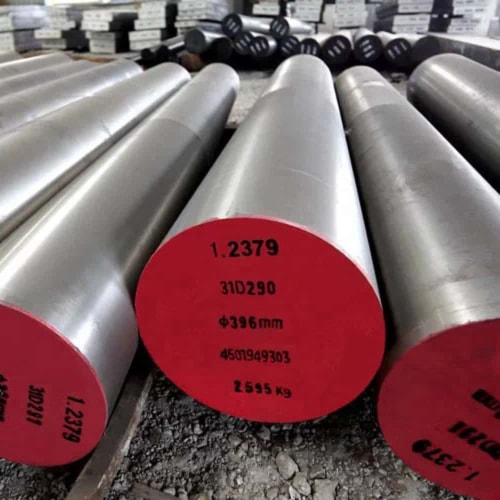Table of Contents
Introduction

When it comes to industrial tools, the materials used play a crucial role in determining the performance, durability, and overall effectiveness of the product. Two commonly used tool steels in the industry are 440C steel and D2 steel. These materials are highly regarded for their distinct properties and are often chosen for high-performance applications in industries like aerospace, automotive, and tooling. However, with so many factors to consider, how do they compare in terms of properties, benefits, and performance?
In this comprehensive guide, we will explore a detailed comparison of 440C vs D2 steel, focusing on their key differences, advantages, and which one is better suited for specific industrial applications. Additionally, we will incorporate insights from Qilu Tool Steel, a global leader in producing high-quality tool steels, including D2, P20, H13, and S7. Understanding the unique characteristics of these materials will help you make an informed decision when selecting the best tool steel for your needs.
What is 440C Steel?
440C steel is a high-carbon, high-chromium stainless steel that is widely regarded for its excellent hardness, wear resistance, and corrosion resistance. As one of the most commonly used martensitic stainless steels, 440C has unique properties that make it well-suited for various demanding industrial applications, including manufacturing of bearings, surgical instruments, knives, and industrial tools.
Martensitic steels like 440C are characterized by their ability to harden through heat treatment, making them ideal for applications requiring superior strength and wear resistance. This steel can be hardened to achieve Rockwell hardness values of 58-60 HRC, making it one of the hardest stainless steels available.
However, what sets 440C steel apart is its combination of high strength, edge retention, and corrosion resistance. These qualities allow it to maintain sharp edges over time, even in environments where exposure to harsh conditions such as moisture or chemicals is common. The high chromium content (16-18%) enhances its ability to resist rust and oxidation, making it a popular choice for applications in corrosive environments.
Key Properties of 440C Steel:
- Hardness: Capable of achieving a Rockwell hardness of 58-60 HRC.
- Corrosion Resistance: Offers good resistance to corrosion due to its high chromium content.
- Wear Resistance: Highly resistant to wear, making it ideal for high-durability applications.
- Toughness: While tough, it may not perform as well as D2 in extreme conditions requiring more impact resistance.
Due to its hardness and resistance to corrosion, 440C steel is often chosen for applications that need both durability and the ability to maintain sharp edges over time.
What is D2 Steel?

D2 steel, also known as 1.2379 steel in Europe, is a high-carbon, high-chromium tool steel with outstanding properties such as exceptional wear resistance, toughness, and the ability to retain a sharp edge under tough working conditions. D2 is classified as a cold work tool steel, which makes it ideal for tooling applications that require high precision, durability, and the ability to withstand harsh environments.
Due to its high carbon content and high chromium content, D2 steel offers superior hardness and strength while retaining its performance in high-wear environments. D2 steel can be hardened to achieve a Rockwell hardness of 58-62 HRC, striking a balance between toughness and wear resistance.
This steel is widely used in industries that demand tools capable of handling high-stress conditions, such as the automotive, aerospace, and die manufacturing industries. D2 steel is favored for its ability to maintain sharp edges even under extreme pressure, making it a reliable material for cutting tools, punches, dies, and other industrial tooling applications.
Key Properties of D2 Steel:
- Hardness: Capable of reaching 58-62 HRC, providing a strong balance between wear resistance and toughness.
- Wear Resistance: Exceptional wear resistance due to its high chromium content and carbon.
- Toughness: Higher toughness compared to 440C, especially under extreme conditions.
- Edge Retention: Known for its ability to retain a sharp edge in harsh, high-stress environments.
D2 steel is considered one of the most reliable tool steels for industrial applications due to its robustness and long-lasting performance in tough environments.
440C vs D2 Steel: Key Differences
While both 440C and D2 steel are high-carbon, high-chromium steels with excellent wear resistance, they have notable differences in their chemical compositions and physical properties, which make them more suitable for different applications. Let’s dive deeper into their primary differences:
| Property | 440C Steel | D2 Steel |
|---|---|---|
| Carbon Content | 1.0-1.2% | 1.4-1.6% |
| Chromium Content | 16-18% | 11-13% |
| Hardness | 58-60 HRC | 58-62 HRC |
| Toughness | Moderate | High |
| Wear Resistance | High | Very High |
| Corrosion Resistance | Excellent | Good |
| Applications | Bearings, knives, surgical instruments | Dies, cutting tools, shear blades, stamping tools |
440C Steel has a higher chromium content, making it more resistant to corrosion. It is best suited for applications where corrosion resistance and edge retention are the highest priorities, such as in bearings and surgical tools.
D2 Steel, with a higher carbon content, offers superior toughness and wear resistance, making it ideal for cutting tools, dies, and other high-wear industrial applications. Its ability to withstand high stress makes it the preferred choice in industries like automotive, aerospace, and tooling.
Performance Comparison: Which is Better for Industrial Tools?
When it comes to choosing between 440C vs D2 steel, performance is key, particularly in industrial applications where tools are subjected to high-stress environments. Let’s evaluate how each steel performs in critical areas such as hardness, wear resistance, toughness, and corrosion resistance.
Hardness
Both steels can achieve similar hardness ratings, with 440C ranging between 58-60 HRC and D2 ranging from 58-62 HRC. However, D2 steel tends to have a slightly higher hardness, making it more resistant to deformation in high-stress applications.
Wear Resistance
D2 steel outperforms 440C in terms of wear resistance, due to its higher carbon content and tougher structure. This makes D2 steel a better option for tooling and dies that are frequently exposed to abrasion and high impact.
Toughness
D2 steel is known for its superior toughness compared to 440C, especially in cold work environments. D2 can absorb more stress without cracking or chipping, making it better suited for cutting tools and industrial dies.
Corrosion Resistance
440C steel has the edge in corrosion resistance due to its higher chromium content. This makes it an excellent choice for tools and components exposed to moisture or corrosive environments, such as surgical instruments and marine bearings.
Applications of 440C vs D2 Steel in Industrial Tools

440C Steel Applications:
- Bearings: Due to its excellent hardness and wear resistance.
- Surgical Instruments: The high corrosion resistance makes it ideal for surgical tools.
- Knives and Cutting Tools: The ability to hold a sharp edge for extended periods.
- Aerospace Components: Lightweight parts requiring high corrosion resistance.
D2 Steel Applications:
- Cutting Tools: High toughness and wear resistance make it perfect for cutting tools like knives, shear blades, and stamping tools.
- Tooling Dies: Used in die manufacturing for stamping, punching, and cutting metal.
- Automotive Industry: Manufacturing high-durability components that are exposed to harsh conditions.
- Molds for Plastic: Ideal for injection molding tools due to its excellent wear and toughness.
Conclusion
When comparing 440C vs D2 steel, both materials offer distinct advantages depending on the application. 440C steel is the best choice for applications requiring high corrosion resistance and edge retention, while D2 steel excels in applications requiring high toughness and wear resistance. The ultimate decision on which steel to use will depend on your specific needs in terms of strength, durability, and environmental conditions.
At Qilu Tool Steel, we offer high-quality D2 steel and other tool steels, including P20, H13, and S7, to meet the diverse needs of industries like aerospace, automotive, and tooling. Our D2 steel products are trusted for their durability and performance in high-demand applications. With our commitment to innovation and excellence, we ensure that our customers receive the best materials for their industrial needs.
FAQ
What is the primary difference between 440C and D2 steel?
The main difference lies in their properties—440C steel excels in corrosion resistance, while D2 steel offers superior toughness and wear resistance, making it ideal for tooling applications.
Which steel is better for cutting tools, 440C or D2?
For cutting tools, D2 steel is typically the better choice due to its higher toughness and wear resistance, making it more suitable for high-impact environments.
Can 440C steel be used in harsh industrial environments?
Yes, 440C steel can handle harsh environments due to its excellent corrosion resistance, but D2 steel may be a better option for environments requiring high toughness and wear resistance.
Is D2 steel more expensive than 440C?
Generally, D2 steel may be slightly more expensive due to its superior toughness and wear resistance, but it is often the preferred choice for tooling and high-performance applications.
✨ Let’s Stay Connected!

If you enjoyed this blog on mechanical parts processing, don’t forget to join me on social media for more insights, updates, and community discussions.
📘 Facebook – Connect with me here
Let’s keep exploring, learning, and growing together. Thanks for reading, and see you in the next post! 🚀

